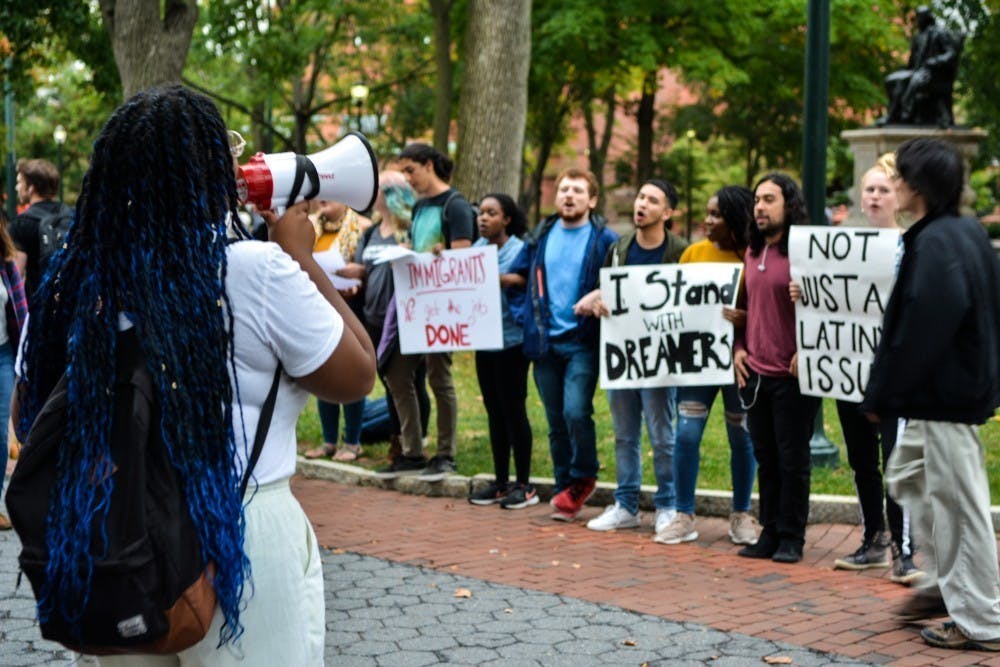
Much to the dismay of students who long for snow days, the only snowflakes Penn has seen this semester have been of the liberal kind.
In 2016, Hillary Clinton secured 91 percent of votes cast on Penn’s campus.
Like the geographic cling wrap that keeps Penn students within the bounds of 30th to 40th streets, a stronger, impenetrable foil wrap keeps in the progressive voices and deflects the conservative. A few stray right-wing molecules float around, making no measurable impact on Penn’s ideological barometer.
Article after article delineates concerns that the progressive echo-chamber perpetuates liberal arrogance, shutting out and alienating a sect of the population that can actually contribute valuable ideas to society.
Remember, one of the main reasons we like diversity in thought is that through the vehicle of debate, we can achieve the end goal of better societal outcomes.
But, it’s a bit simplistic to think that every issue necessarily fits this cookie-cutter method to improve society. On issues of minorities’ rights, perhaps a one-sided conversation ensures the better societal outcome. Perhaps limiting conservative viewpoints serves to halt the perpetuation of traditionally stronger voices, giving a voice to those who have been historically silenced.
Perhaps the liberal snowflakes have a point.
Here’s the issue where it matters: The lives of racial minorities should not be used as horseplay for political banter. This is a realm where viewpoints from the right seek to silence those who have already been traditionally suppressed.
Penn Law professor Amy Wax recently made headlines again for a new Wall Street Journal opinion piece arguing against the ostensible lack of “civil discourse” on college campuses. On this, columnist Dylan Reim wrote “we think people with fundamentally different views are attacking us.”
Reim makes a valid point about the necessity of opening dialogue, but this is a generalization that assumes that every single issue has multiple valid philosophical interpretations. The truth is that our society has already objectively rejected many ideas — racism being chief among them. Racial affairs is not an issue where the left and right can sit in a room, pour tea, munch crackers, and hash out a great societal outcome.
Let’s be clear: I’m not trying to advocate for the stifling of dichotomous voices in a healthy debate on tax reform. I’d hate for the left to exclude the right in immigration policy or marijuana legalization debates. I don’t want to end heated discussion on how to reach bipartisan consensus on facing the national debt.
But, I will refuse to dignify “discourse” on my inferiority, especially in an environment where conservative ideas perpetuate minority discrimination. Open debate cannot be a chance for politics to rebut my identity. The liberal push-back defends intolerance of ideas that society agrees are fundamentally injurious.

While Wax claims to be supporting academic discourse, her words can — albeit unintentionally — fuel hate on campuses. Exhibit A: the result of the 2016 presidential election, while not directly racist, validated hate and allowed it to flourish. White-supremacist propaganda increased at colleges by 258 percent from fall 2016 to fall 2017. Hate crimes on campuses increased by 25 percent from 2015 to 2016, with a spike in November 2016. Many of these incidents made references to the then-president-elect.
Wax may not be a white supremacist, but if her words substantiate an argument of racial superiority, she carries a great responsibility. While she may consider her writing from a purely academic standpoint, the truth is that, for the marginalized, politics and daily life are inseparable. This “civil discourse” is workplace wordplay for some. For others, it’s daily insecurity. For yet others, it’s constant fear of police brutality.
Eighty percent of Republicans do not support the Black Lives Matter movement. After his nomination by the Republican Party, Donald Trump told the Associated Press that the movement was “inherently racist.” Sen. Rand Paul (R-Ky.) prefers “All Lives Matter.” Rather than offering meaningful discourse, some of these conservative voices seek to mute those that have already been historically unable to speak.
Conservatism, by definition, perpetuates the status quo. When that status quo is the preservation of an imbalance in power, the left’s lack of malleability in its opinions is a lack of tolerance for being silenced.
Many Black Lives Matter supporters face inescapable daily persecution that some conservatives who are against the movement will never experience. For the victimized, racial affairs transcend politics. Those that are against marriage equality can preach to crowds and then get on with their days, unaffected. For a young gay couple, the issue extends beyond a protest — it shapes their daily lives.
Debate is great. But there are issues that are so fundamentally entangled in a group’s basic rights that they transcend the arena of meaningful political discussion. Liberal “intolerance” evens the historically unbalanced playing field. Maybe it’s time to stop hiding blatant discrimination under the guise of political discourse.

LUCY HU is a College sophomore from Auckland, New Zealand, studying political science. Her email address is lucyhu@sas.upenn.edu. “Fresh Take” usually appears every other Sunday.
The Daily Pennsylvanian is an independent, student-run newspaper. Please consider making a donation to support the coverage that shapes the University. Your generosity ensures a future of strong journalism at Penn.
Donate





